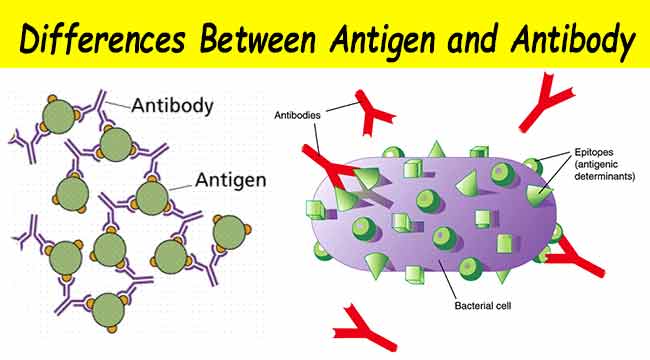Antibodies, also called immunoglobulins, Y-shaped molecules are proteins manufactured by the body that help fight against foreign substances called antigens. Antigens are any substance that stimulates the immune system to produce antibodies. Antigens can be bacteria, viruses, or fungi that cause infection and disease. Following are some of the differences between Antigen and Antibody:
| S.N. | Antigen | Antibody |
|---|---|---|
| 1 | Generally proteins but can be lipids, carbohydrates or nucleic acids. | Antibodies are proteins. |
| 2 | Triggers the formation of antibodies. | Variable sites has the antigen binding domain. |
| 3 | There are three basic kinds of antigens. (Exogenous, Endogenous and Autoantigens) | There are five basic kinds of antibodies. (Immunoglobulins M, G, E, D and A) |
| 4 | The region of the antigen that interacts with the antibodies is called epitopes. | The variable region of the antibody that specially binds to an epitope is called paratope. |
| 5 | Cause disease or allergic reactions. | Protects the body by immobilization or lysis of antigenic material. |


is Antigents is bad for human Body?
Actually no it is not bad because without it the antibodies will be weak
But how is it that antigens attack and antibodies defend?
Through activation of B cells by T cells that is cytotoxic and T helper, supper cell which induce signal through the antigen present cell presenting signal to the B cell resulting in secretion of immunoglobulin G first and the rests come like IgM I’m and another causing oponization, neutralize of a reaction.
Foreign Microbes has surface proteins which acts like a key , which helps them to enter our Body Cell.
So antibodies acts like a lock for there key. If No key is free then how they can enter?… No way ☺️
there is a context that antigens do attack when they are of pathogens means they are foreign and antibodies do defend when antigens are foreign as recognized by pathogen associated immunostimulants
antigens are the attackers while antibodies are defenders or blockers of antigens that cause diseases.
What’s makes the anti gene and antibodies differ
Antibody differs from antigen because antibody are the immune fighters(warrior). They fight and protect the body from foreigners which are the bacteria, virus, fungi etc.
Antigen are foreigners that attack the body and causes damage(disease) to the immune system or the body entirely.
as antigens are foreign substances of the disease causing organisms while antibodies are the substance or correctly saying produced by our own immune cells to destroy them by phagocytosis
HBV positive. Ag HBs positive reactif 6750.07 ul/ml what does it mean, is it good for the body or bad.
Can u please tell how antibodies against other blood group are present naturally in our body?
This was 4 years ago but I’m responding for others who are wondering this. In simplest terms, lets say your blood is Type A and Type B blood enters your body. Although it is blood which occurs in everyone’s body, since you are type A, you have B antibodies to attack B blood (Type B blood having B antigens (protein bumps) on the red blood cells surfaces) which is why the antibodies and white blood cells will attack, B blood is “foreign” according to the antigens. If your wondering about A+ blood versus A- blood, if blood is + it has an antigen called the rhesus factor. If you have + blood you can receive + blood but if you are – blood you cannot receive positive blood because you have the antibody for the rhesus factor because you don’t have it, doesn’t matter if both blood is the same type… hope this helps someone.
To formally answer the question- your body makes antibodies to any foreign invader and your body thinks other blood types are foreign invaders from antigens- hence why you will have antibodies for other blood types.
Antigens are the key to develop antibodies against specific infection or disease that caused by the antigen (foreign substance) itself.
It’s right and their production comes about as a result of medications for instance patients administered with alpha-methyl dopa develop haemolytic anaemia due to the production of RBC auto-antibodies, but it’s also seen that the anemia resolves on stopping the use of this drug.
Autoantibody can attack our self-antigen and cause autoimmune diseases.